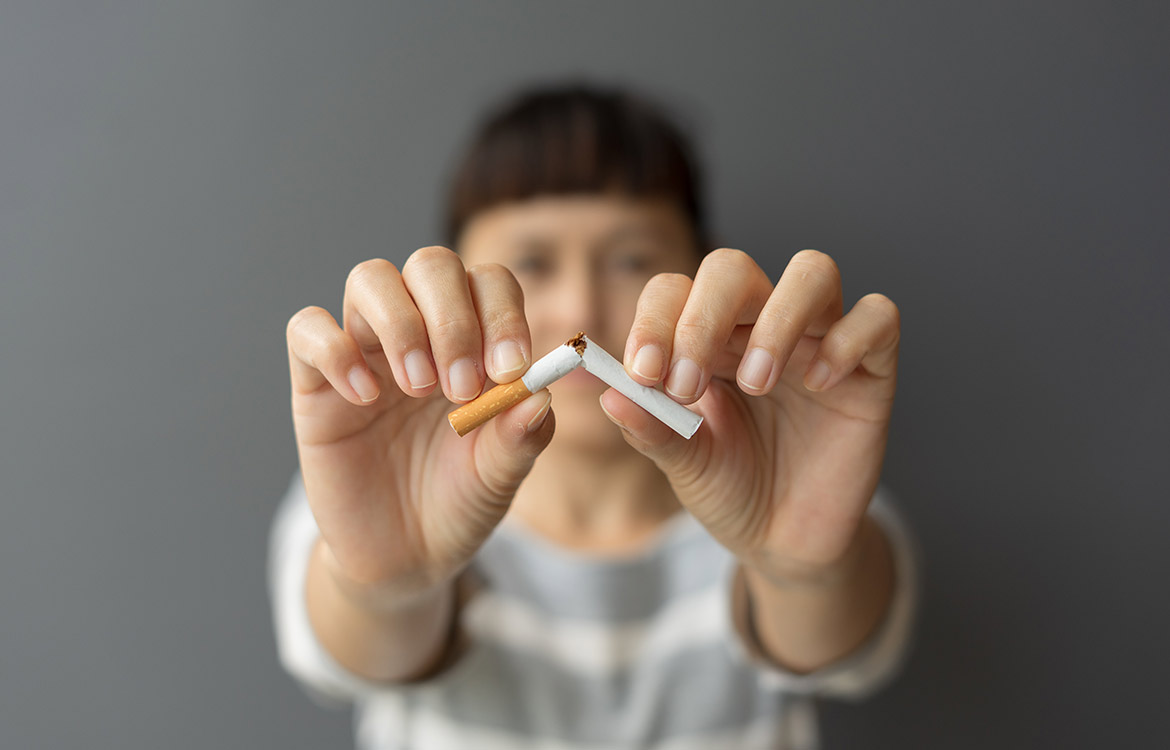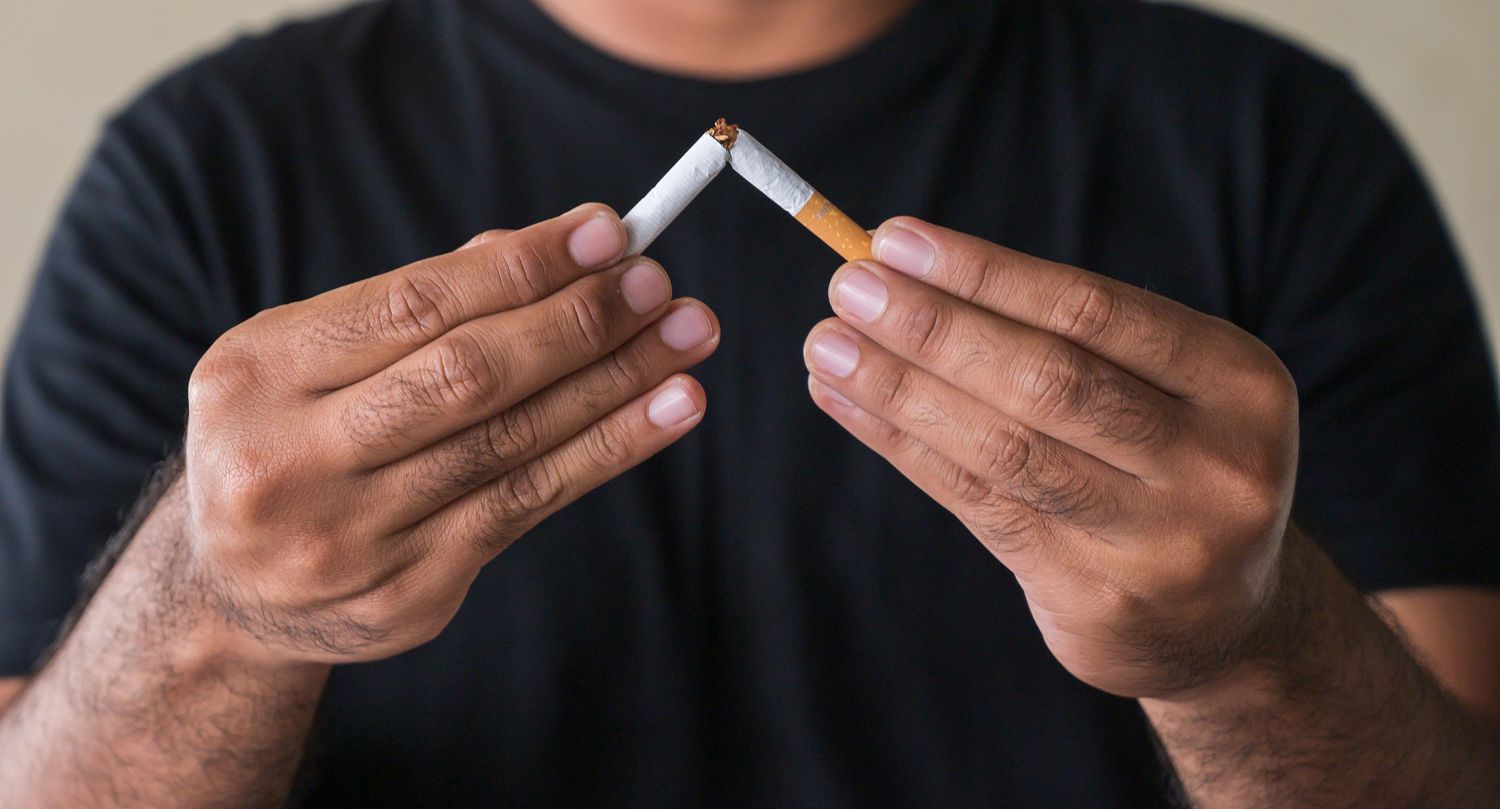Quitting Smoking Benefits - Unlocking A Smoke-Free Future
Discover a new lease on life with the myriad quitting smoking benefits. From improved respiratory health to enhanced mental well-being, explore the transformative journey toward a healthier, happier you. Say goodbye to cigarettes and hello to a brighter future.
Author:James PierceReviewer:Karan EmeryFeb 14, 2024262 Shares20.1K Views

In the relentless pursuit of a healthier and more vibrant life, few decisions can be as transformative as choosing to quit smoking. For countless individuals, smoking has been a persistent companion, entwined with routines and habits. However, breaking free from the grasp of cigarettes unveils many benefits that extend far beyond the realms of physical health.
In this exploration, we delve into the remarkable quit smoking benefits, unraveling a well-being that encompasses the body, mind, and spirit. This journey toward a smoke-free life is not merely relinquishing a harmful habit; it is a profound commitment to self-improvement and a gateway to a brighter, more fulfilling future.
Quitting Smoking Health Benefits
Embarking on the journey of quitting smoking isn't just a positive choice; it's a transformative leap towards a healthier, more vibrant life. Regardless of age or smoking history, this decision brings a cascade of improvements:
- Enhanced Health and Quality of Life -Quitting smoking elevates your health status and enriches your overall quality of life. The positive impact resonates across various facets of well-being.
- Extended Life Expectancy - Witness a remarkable boost in life expectancy, with the potential to add up to a decade of precious, smoke-free years. Quitting is an investment in a longer, healthier life.
- Reduced Health Risks -Experience a significant reduction in the risk of numerous adverse health effects. From cardiovascular diseases to chronic obstructive pulmonary disease (COPD) and cancer, quitting is a powerful shield against these threats.
- Benefits for Those with Existing Conditions -Even if you've been diagnosed with coronary heart disease or COPD, quitting smoking offers tangible benefits, contributing to the management and improvement of your health.
- Positive Impact on Pregnancy -Pregnant women and their fetuses receive invaluable health benefits when smoking is abandoned. This decision positively influences the health outcomes for both mother and child.
- Financial Relief -Beyond health, quitting smoking alleviates the financial burden it imposes. Experience relief from the strain on personal finances, healthcare systems, and the broader societal impact.
- Never Too Late to Quit - While quitting earlier in life maximizes health gains, the benefits of quitting smoking are accessible at any age. Even those who have smoked for an extended period or heavily can reap the rewards of a smoke-free life.
- Protecting Loved Ones -Quitting smoking isn't just a personal triumph; it's the single best way to shield family members, coworkers, friends, and others from the health risks associated with secondhand smoke. It's an act of care that extends beyond oneself.
Cardiovascular Health Quitting Smoking Benefits
In the quest for heart health, quitting smoking stands out as a pivotal and empowering step. This decision holds profound significance for individuals aiming to mitigate their risk of cardiovascular disease, offering a spectrum of benefits:
- Risk Reduction for Cardiovascular Disease - Quitting smoking is a potent shield against cardiovascular disease, lowering the risk of both disease and death associated with heart-related complications.
- Inflammation and Coagulation Improvement -The positive impact isn't just on the surface. Quitting smoking diminishes markers of inflammation and hypercoagulability, contributing to an internal environment that supports cardiovascular well-being.
- HDL-C Level Enhancement -Experience a rapid improvement in high-density lipoprotein cholesterol (HDL-C) levels, a key component in the complex interplay of cholesterol and heart health.
- Protection Against Atherosclerosis -The journey of quitting not only prevents but actively works against the development of subclinical atherosclerosis, slowing its progression over time.
- Rapid Reduction in Coronary Heart Disease Risk -Witness a swift reduction in the risk of coronary heart disease, with the risk falling significantly within the first 1-2 years after cessation and continuing to decline over the long term.
- Stroke Risk Reduction -Embrace a lowered risk of disease and death from stroke, approaching the levels of those who have never smoked after successfully quitting.
- Aneurysm Risk Reduction -Quitting smoking is a guardian against abdominal aortic aneurysms, with the level of risk reduction increasing as time since cessation progresses.
- Potential Risk Reduction for Various Cardiovascular Conditions -Beyond the more commonly known benefits, quitting smoking may also reduce the risk of atrial fibrillation, sudden cardiac death, heart failure, venous thromboembolism, and peripheral arterial disease (PAD).
- Benefits for Those with Coronary Heart Disease -Individuals diagnosed with coronary heart disease find solace in the fact that quitting smoking post-diagnosis significantly reduces the risk of premature death, death from heart disease, and the occurrence of subsequent heart attacks.
Quitting Smoking Benefits On Respiratory Health
In the pursuit of vibrant respiratory health, quitting smoking emerges as a beacon of hope, offering an array of benefits to those seeking to reduce their risk of respiratory diseases. This transformative decision not only alters the course of potential ailments but actively contributes to the enhancement of respiratory well-being:
- Guardian Against COPD -Quitting smoking is a formidable defense against Chronic Obstructive Pulmonary Disease (COPD), significantly reducing the risk of its development.
- Progression Slowdown for Those with COPD -For individuals already grappling with COPD, the decision to quit smoking becomes a powerful ally. It not only slows the progression of the disease but also curtails the loss of lung function over time.
- Alleviation of Respiratory Symptoms -Experience a tangible improvement in respiratory well-being as smoking cessation brings about a reduction in common symptoms such as cough, sputum production, and wheezing.
- Defense Against Respiratory Infections -Quitting smoking acts as a shield against respiratory infections, including bronchitis and pneumonia. The immune system, freed from the burden of smoke, becomes more robust in warding off these ailments.
- Potential Improvement in Lung Function -Embrace the prospect of improved lung function as quitting smoking may not only halt the decline but potentially reverse some of the damage caused by smoking. This positive impact is particularly significant for individuals with asthma, leading to enhanced treatment outcomes and a reduction in symptoms.
Reproductive Health Quitting Smoking Benefits
In the profound journey toward motherhood, quitting smoking stands out as a pivotal and empowering step, offering substantial benefits for both women and their unborn babies. The significance of this decision is not bound by timing; whether before conception or during pregnancy, the positive impact on maternal and fetal health is undeniable:
- Preconception Commitment -The optimal period for women to quit smoking is before attempting to conceive. This proactive step serves as a foundation for a healthy pregnancy and a thriving baby.
- Risk Reduction for Small-for-Gestational-Age Babies -Quitting smoking before pregnancy or early in gestation is a powerful strategy in reducing the risk of delivering a small-for-gestational-age baby. This decision positively influences the baby's growth trajectory, fostering optimal development.
- Low Birth Weight Prevention -Among the myriad benefits, quitting smoking during pregnancy significantly reduces the risk of delivering a low birth weight baby. This is a critical aspect of ensuring the newborn's health and resilience.
- Elimination of Adverse Effects on Fetal Growth -The early cessation of smoking during pregnancy serves as an intervention to eliminate the adverse effects of smoking on fetal growth. This proactive step contributes to an environment conducive to healthy development.
- Preterm Delivery Risk Reduction - Quitting smoking before pregnancy or in the early stages may also reduce the risk of preterm delivery, underscoring the far-reaching positive impact of this decision on maternal and infant well-being.
Symptoms When You Quit Smoking
As your body undergoes the process of recovery, it's essential to acknowledge and manage the various symptoms that may arise, recognizing that each is a temporary signal of your body's healing and adjustment to a smoke-free life.
Common Symptoms
- Cravings - Expect strong cravings initially, but take solace in the fact that they typically last only a few minutes. Resisting each craving is a victory, and with time, their intensity diminishes.
- Restlessness and Trouble Concentrating or Sleeping - As your body adapts to the absence of nicotine, you may experience restlessness and difficulty concentrating or sleeping. Incorporate relaxation techniques and deep breathing into your routine to ease these transitional discomforts.
- Irritability, Anger, Anxiety, Depressed Mood - Emotional fluctuations are normal during this period. Accept these feelings as part of the process, understanding that they are transient and will subside over time.
- Increase in Appetite and Weight Gain - A heightened appetite and potential weight gain may persist for several weeks. Strategic planning, along with tips here on managing weight gain when quitting, can be valuable during this phase.
Less Common Symptoms
- Cold Symptoms - You might experience symptoms resembling a cold, such as coughing and sneezing. Recognize these as your body's way of clearing out the remnants of smoking.
- Constipation - Some individuals may encounter constipation, a passing symptom as the body adjusts to the absence of nicotine.
- Dizziness or Light-headedness - Occasional feelings of dizziness or light-headedness may occur, reflecting the body's recalibration without the influence of tobacco.
- Mouth Ulcers - Mouth ulcers, while less common, can be a temporary side effect. Remember that these too shall pass.
As time unfolds, the intensity of these symptoms will gradually diminish, and thoughts of smoking will dwindle. If you find yourself grappling with severe or persistent symptoms, seeking guidance from a health professional is a prudent step. Nicotine replacement therapy or prescribed stop-smoking tablets can also be instrumental in managing these challenges effectively.
Caffeine And Alcohol
Tobacco smoke affects caffeine and alcohol metabolism, making it advisable to moderate their consumption during the quitting process. Reducing intake of caffeinated drinks and foods, such as coffee and chocolate, can aid in managing symptoms. If you consume alcohol, discussing your smoking cessation journey with your doctor is crucial, as it may impact both your approach to quitting and overall health considerations.
Timeline Of Quitting Smoking
Embarking on the path to quit smoking is a transformative journey that unfolds with remarkable immediacy. The body's response to this positive change is both swift and profound, paving the way for a healthier, smoke-free future.
- After 20 Minutes -Within the first 20 minutes of extinguishing the last cigarette, the heart rate begins its descent to normalcy, and blood pressure takes the first steps toward reduction. Circulation initiates an improvement, setting the stage for the body's recovery.
- After 12 Hours -Cigarettes unleash over 7,000 chemicals, including the hazardous carbon monoxide. In just 12 hours without smoking, the body starts its cleansing process, ridding itself of excess carbon monoxide and replenishing oxygen levels. This critical shift fosters improved respiratory function and enhanced well-being.
- After 1 Day -A mere 24 hours after bidding farewell to smoking, the risk of heart attack starts its decline. Blood pressure takes a downward turn, reducing the threat of heart disease induced by smoking. Elevated oxygen levels empower individuals to engage in heart-healthy activities, promoting a renewed focus on well-being.
- After 2 Days -The intricate nerve endings responsible for smell and taste, damaged by smoking, commence their healing process. In just 2 days, individuals may revel in a heightened sense of smell and a more vibrant taste experience, a testament to the body's remarkable restorative abilities.
- After 3 Days -The bronchial tubes, burdened by the effects of smoking, begin to relax after 3 days of quitting. Breathing becomes noticeably easier, and energy levels receive a boost, signaling the body's resilience in recovering from the grip of nicotine.
- After 2 Weeks -Around the 2-week mark, the wheels of circulation set into motion, facilitating smoother blood flow through the heart and muscles. Simultaneously, lung function embarks on a positive trajectory, contributing to enhanced respiratory capabilities.
- After 1 Month -As the calendar turns to the first month without smoking, the symphony of health improvements continues. Coughing and shortness of breath diminish, and the microscopic cilia in the lungs regain functionality, reducing the risk of infections and ushering in revitalized lung health.
- After 3-9 Months -Between 3-9 months post-smoking cessation, lung function undergoes a commendable 10% improvement, offering respite from coughing, wheezing, and breathing challenges.
- After 1 Year -The one-year milestone marks a significant turning point. The risk of heart attack and coronary heart disease plummets to half that of a smoker, underscoring the profound impact of sustained smoke-free living.
- After 5 Years -At the 5-year juncture, the risk of specific cancers diminishes by half, encompassing the mouth, throat, esophagus, bladder, and reducing the risk of cervical cancer and stroke to that of a non-smoker.
- After 10 Years -A decade without smoking yields substantial dividends, slashing the risk of lung cancer and related mortality by half. The risks of larynx and pancreatic cancer also witness a notable decline.
- After 15 Years -The culmination of 15 years without smoking brings about a remarkable transformation. The risk of coronary heart disease aligns closely with that of a non-smoker, illustrating the enduring benefits of a committed journey to quit smoking.
Frequently Asked Questions
Will I Look Younger If I Stop Smoking?
Cessation of smoking increases the resistance of the epidermis to premature aging. Regarding the existing creases and age spots, all is not lost. According to Keri, a dermatologist at the University of Miami, former smokers can improve the appearance of their complexion with the use of certain products.
Will I Get Bigger If I Stop Smoking?
Some individuals are concerned that quitting smoking will result in weight gain. Although the majority of individuals do gain some weight after quitting, it is typically only a small amount. In the course of five years, individuals who quit smoking acquire an average of four to five kilograms of weight.
What Are The Beauty Of Quitting Smoking?
Some individuals are concerned that quitting smoking will result in weight gain. Although the majority of individuals do gain some weight after quitting, it is typically only a small amount. In the course of five years, individuals who quit smoking acquire an average of four to five kilograms of weight.
Why Am I So Tight Chested After Quitting Smoking?
Withdrawal symptoms associated with tobacco cessation, such as chest pain or constriction, are frequently encountered. This can result from nicotine cravings and is accompanied by moderate to severe pain. Considering that smoking can induce chest pain, it is possible that experiencing pain or constriction following cessation could come as a surprise.
Conclusion - Quitting Smoking Benefits
The decision to quit smoking is not just a triumph over addiction; it is an investment in a life imbued with vitality and wellness. As the physical and mental benefits unfold, the ex-smoker finds themselves on a journey of self-discovery and empowerment.
So, for those contemplating the path to quitting, remember that it is not merely the extinguishing of a cigarette but the illumination of a brighter, healthier, and more vibrant existence. Embrace the journey, savor the victories, and revel in the countless benefits that accompany the brave choice to quit smoking.
Jump to

James Pierce
Author

Karan Emery
Reviewer
Latest Articles
Popular Articles


